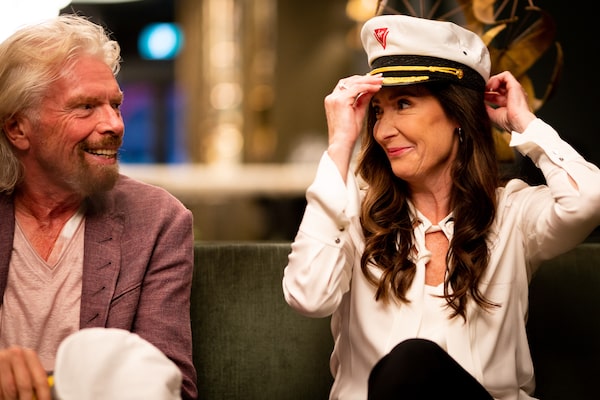
Wendy Williams and Richard Branson, owner of Virgin Voyages.Handout
Wendy Williams is the first Canadian woman named captain of a large passenger cruise ship, Virgin Voyages’ Scarlet Lady. From Sept-Îles, Que., the master mariner’s expertise includes years on fishing trawlers, a deckhand in commercial fishing, and officer and staff captain positions on passenger vessels.
Where did your love of the ocean start – where did you grow up?
Growing up on a coast, I was taught to always respect and love the ocean. My dad was a marine electronics technician, his shop servicing the fishing fleet to large bulk carriers. I was on the boats at three years old and we fished, swam. We moved to Ontario, then B.C., so I went to different schools, graduating at 16. We moved again so I re-enrolled, [annoyed] I didn’t go to university. Looking back, I wasn’t ready. Although it was tough, making new friends is my superpower.
Any false starts?
After graduating high school again, I took first-year sciences at the University of British Columbia – marine biology, my dream. Then after many conversations, nursing. I liked it, but it wasn’t in my heart, my rationale being “I can always take care of people – but a lifetime?” My parents said to try so I kept plodding. Through school, I’d worked summers as an at-sea Archipelago Marine Research observer, not once touching land, back just before school. Over those 10 years I loved being on the bridge. Then I was on foreign fish factory trawlers in Canadian zones – the only female. Being an only child, I don’t mind long hours or days away from everything, I don’t get bored.
That trawler gig can’t have been as easy as you nonchalantly imply?
I wanted to navigate; it’s fantastic to take a vessel [somewhere], using clouds, weather, stars, instruments. I look back at situations, more enlightened now [about] what a woman doesn’t need to accept. I used to say, “I don’t have war stories.” I did. I chose to put my head down and not think about them; maybe they’d go away. One of the weirdest moments in my life: As you rise in the ranks, some companies send you for psychological testing if you’re suitable to be captain. After being a captain already many years, I was sent. The psychologist said – so strange as [it was] only two years ago: “You’re too girly to be a captain.” He actually said those words. “The reason you’re not going to make a good captain is you’re too nice.” I thought, if you’re going to mistake my kindness, laughter and smiles for weakness, you are really mistaken.
What’s your specialized training?
In nautical sciences, you need 365 days at sea. The Archipelago years didn’t count so I became a deckhand on my [now] husband’s boat. We saw the writing on the wall, decimating fish stocks in our small way. “Let’s go to school!” We were desk mates, coaching each other. I applied online to [cruise line] Royal Caribbean, and was snapped up that week. The boat I’d come off would fit across its bridge four times end-to-end. I also speak English, French, am okay in Spanish, dabble enough in others to get by, and learned to speak enough Polish I can use sarcasm.
How does the marine industry attract women?
In the world’s 1.2 million seafarers, females are only 2 per cent; 94 per cent in the cruise industry. There’s a lack of awareness; careers aren’t known unless you’re in the industry. They’re not mainstream jobs, not advertised, no “Come try this.” Seafaring is steeped in – almost mystically – history, pirates, men who ran the ocean, entrenched military titles and “malespeak.” On the bridge, we’re genderless. The “Scarlet Squad” is our company’s imperative to create gender diversity ... we need different backgrounds and experiences. So far, the ship has 15 female officers and engineers with leadership opportunities in technical and hotel management.
Do you find that those 365 days needed at sea deter women with children?
There’s a lack of support from society, the industry and [there are] stigmas: “What do you mean you’re leaving your family?” I was lucky to meet a partner who, as captain, was always so supportive. Many companies don’t provide maternity, most no paternity leave. Friends – tanker captains – raised entire families, their husbands looking after kids. There’s also a lack of mentoring for females, not as many role models to give support.
Favourite parts of your job?
I get to be at sea where I feel at peace with such clarity of thought. I love to meet people, like a “master” of ceremonies, and to make a ship come to life with hardworking crews. And the ship! You’re just not given that kind of hardware every day.
This interview has been condensed and edited.
Stay ahead in your career. We have a weekly Careers newsletter to give you guidance and tips on career management, leadership, business education and more. Sign up today.